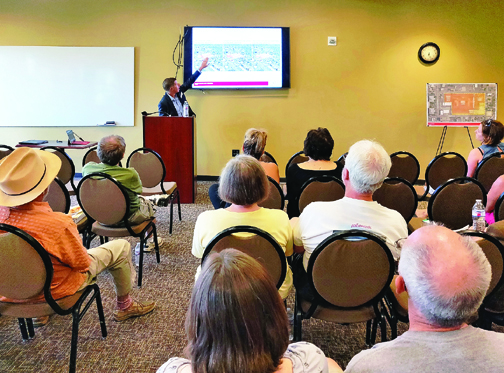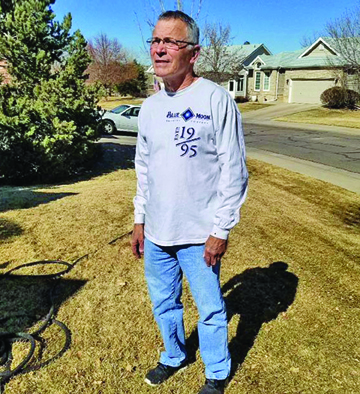
by Mark Smiley | Jul 20, 2018 | Main Articles
Will Proposal ‘Activate’ East Virginia Village Neighborhood Or Help ‘Destroy’ It
by Mark Smiley

Old Headquarters: CDOT moved its headquarters from this location pictured to a new $70 million building southeast of the West Colfax Avenue and Federal Boulevard interchange.
The recent departure of the Colorado Department of Transportation (CDOT) from its headquarters located at 4201 E. Arkansas Ave. has left neighbors and surrounding businesses wondering what the City and County of Denver will do to their neighborhood. Initial indications are they are planning the usual — massive high density and crippling traffic.
The City of Denver is uniquely in charge of the large 13.2-acre parcel as the plan to purchase the old CDOT headquarters, between Louisiana and Arkansas Avenues east of Colorado Boulevard, as well as a second 11.5-acre CDOT-owned property at 2000 S. Holly Street (Holly and Evans) for $19.25 million. State law mandates that the CDOT properties were first offered for sale to other government agencies.

Developer: Dimitrios Balafas of Kentro Group will oversee the development of the old CDOT property at 4201 E. Arkansas Ave and 2000 S. Holly Street once the sale is complete.
So Denver owns and will do all the planning on this critical piece of the East Virginia Village neighborhood property. Councilman Jolon Clark has stated that Denver needs, and wants, to expand and improve its inner city park system as “green spaces are getting too crowded” and is proposing an increase in the sales tax which would provide over $45.9 million for such purposes.
Cynics suggest that the Clark proposal is little more than Denver overpaying for property owned by those close to City Hall that developers nor anyone else wants. However, they note the CDOT property is one in a beautiful neighborhood setting that could be exploited for a great deal of profit by a developer and thus perhaps not the type of property which would be covered by the proposed project.
In turn, Denver will buy the land and immediately flip it to the politically connected Kentro Group, a local developer of such projects as Trader Joe’s at 8th and Colorado Blvd., the new TMobile store on Colorado Blvd. and Kentucky Avenue, the development at Cherry Street and Leetsdale in Glendale, and the Colfax Collection at York and Colfax and Josephine and Colfax.
But it will only do so after getting it rezoned for massive high density which, of course, the City controls through the Denver Planning Board and City Council.
Kentro Group has held a series of community meetings dating back to January 25, 2018, laying out their plans for the 13.2-acre property where CDOT once stood. Some neighbors who attended for the first time the July 12, 2018, meeting at Infinity Park in Glendale claimed it is the first notice of any meetings held by the group. And, some were not pleased with what they saw.
One neighbor said, “Don’t bring the tech center to our mid-century neighborhood.” And, Shelley Stuart-Bullock said, “Picture multiple 110+ foot buildings; 11,200 more cars daily on residential streets. I chose to live here in 1989, but would need to leave. I am greatly saddened by the prospect.”
The traffic along Colorado Boulevard and in and around their neighborhood is what neighbors are most concerned about. Some say adding 11,000 more cars along Colorado Boulevard will cripple the corridor between Alameda and Evans, rendering it next to impossible to drive a car.
I’m all for drive-by traffic. Many businesses, including ours, survive on eyeballs seeing your business every day while driving by — but let’s face it, it [Colorado Blvd.] already has plenty of traffic, said Sean Sutton, owner of SleepNation which is

Neighbors Activated: Kentro Group and CRL & Associates have held a series of community meetings to inform the public of their plans for the old CDOT property. This July 12 meeting held at Infinity Park in Glendale sparked a lively discussion about the increased traffic along Colorado Blvd. and the surrounding neighborhood.
situated directly on the corner of Colorado Boulevard and Arkansas, two blocks from the old CDOT property. “What you don’t want is for it to end up having so much traffic, and cause so much congestion that people eventually take alternate routes and stay away from you. People who live in surrounding neighborhoods that pass through on Colorado Blvd. and see our sign every day may take a different route to avoid traffic.”
“We are trying to help minimize the impact,” said Chris Viscardi, Director of Development for Kentro Group. “My concern is that what ends up on that property enhances rather than overwhelms it,” said Denver City Councilman Paul Kashmann. However, it is difficult to imagine how the impact can be minimized when that many more cars will be planted on the busiest street in the state. Denver Public Works will weigh in on the traffic impact later in the process.
Kentro Group began the process of inspecting the old CDOT property in February 2018 and has 150 days to continue inspections. And, since the property at 4201 E. Arkansas is zoned for campus and not retail, they will need to get approval from the Denver Planning Board and eventually City Council to be able to build a mixed-use development of housing and retail.
And those plans currently call for buildings as tall as eight stories with an additional 150,000 square feet of commercial retail space. The overall project will also include 150 units of affordable housing according to representatives from the Kentro Group. The mixed-use development is “to create diversity and for Kentro, to create a destination,” said Stacey Weaks, Principal of Norris Design who is drawing up plans for the property.
A person associated with the Denver Planning Department indicated that what that actually means is: “The Virginia Village neighborhood is filled with older middle-class whites who are generally despised by City Hall. They want a City with young hip kids who don’t drive cars and do what they are told. According to Channel 9 families with younger kids are actually moving in to the Virginia Village area which City Hall believes has to be stopped. These people are not welcomed in the new City and County of Denver. Only the young hipsters, the undocumented, the very wealthy and the existing poor are officially welcomed. The rest are welcomed to move out to the god-forsaken suburbs as soon as reasonably possible.”
For those familiar with the yet to be completed 29-acre project at 9th and Colorado Boulevard, Dimitrios Balafas, co-founder and managing partner of Kentro Group admitted this project can be seen as “9th and Colorado Junior.” But, he views this project as activating a neighborhood that desperately needs it.
“I think we will come up with a design that will activate the Virginia Village neighborhood which is what this neighborhood lacks now,” said Balafas. “We’re local, we care about the community, and we want to build a good project. We’re listening.” Balafas has been in the community since the early ’80s and some attendees of the July 12 meeting appreciated that this project would not be in the hands of an out of town developer.
One attendee who did not wish to be identified remarked, “What is this ‘activate’ b.s. that Kentro tells us we want? Virginia Village neighborhood is a wonderful quiet residential area, but we are only a few blocks from either Colorado Boulevard or Leetsdale Drive. What do we need? More crime, more muggings, more homeless vagrants, more heroin needles strewn on sidewalks?”
Her companion noted, “Why doesn’t Kentro first ‘activate’ the Country Club area where Dimitrios Balafas lives. I am sure he and his neighbors would love it.”
The scope of the project may tip the $100 million mark and may take two to three years to complete. To put it in perspective, the 9th and Colorado project, which is not complete, has been on the clock for five years. The buildings on this parcel reach as high as 12 stories which is what Kentro Group originally proposed. They recently scaled it down to a maximum of eight stories.
Skeptics wonder if this was the plan all along. One neighbor who pr

Crippling Traffic: Colorado Blvd. is already the busiest street in the state. It is feared that the development at 9th and Colorado Blvd. and the old CDOT property will bring traffic to an unbearable crawl during certain hours of the day.
eferred not to be identified said, “This is what developers do. They initially propose something they know the residents will oppose and then scal

Lobbyist: Sean Maley of CRL Associates, Kentro Group’s lobbying firm, fielded tough questions from the audience at the July 12, 2018 meeting at Infinity Park in Glendale.
e the project back to make it seem that they have listened to our concerns. It is a complete smokescreen and we are not buying it.”
CRL and Associates is the lobbyist for Kentro Group on this proposed rezoning and development. Sean Maley, Partner & Chief Business Development Officer for CRL, was at the July 12 meeting and claims they are listening to the needs and concerns of the neighborhood. We are “working our best to work with the neighborhoods,” said Maley. “We are pleased with the level of input at these meetings.”
Maley’s appearance was not welcomed by many in the crowd. “I know that CRL and the Brownstein law firm owns the City Council, but do they have to make it so obvious,” stated one attendee.
The next step in the process is the consideration of the rezoning application submitted by Kentro Group. The Denver Planning Board is predicted to consider this at o

Redevelopment Plans: The plans for the old CDOT headquarters property include eight-story residential buildings. These are approximately the same height as the Empire Park office buildings across the street at 1325 South Colorado Blvd.
ne of their September meetings (either September 5 or 19). The meetings are held in the Parr-Widener Community Room (#389), City and County Building, 1437 Bannock St. Meetings are also broadcast live on Denver’s Channel 8 and online at www.Denver8.TV.
The communication tower on the east side of the property is not included in the acquisition and the State of Colorado will retain ownership.
The matter will then be considered by Denver City Council at what will most likely be a November 2018 meeting. For more information about how to become engaged with the neighbors who plan to oppose the project, visit their Facebook page at “Help Oppose CDOT Redevelopment.” For more information about Kentro Group and this specific project, visit www.kentrogroup. com/arkansas.

by Mark Smiley | Jun 28, 2018 | Main Articles
Developments Blurred By Ownership Changes; New Mall Encounter: 300 Small Shops Opening
by Glen Richardson

Chopped Hamburger: Unico Properties has acquired four-properties on the north side of 2nd Ave. including the Cherry Cricket restaurant building. With a long-term lease the popular eatery isn’t expected to be touched. Major changes are expected for two buildings along Clayton St.
Don’t look for that deluge of cranes and construction zones symbolizing the changing face of Cherry Creek to vanish anytime soon. Why? The entire west end of Cherry Creek North — including the Cherry Creek Shopping Center’s western portion — is getting set to undergo sudden and unforeseen adjustments and revision.
The changing ownership of properties, moreover, is making the entire equation increasingly complicated. Consider these twist and turns: Brookfield Asset Management just closed on its acquisition of OliverMcMillan, the redeveloper of the Clayton Lane development anchored by Whole Foods Market and Crate & Barrel. Moreover, of course, Amazon purchased Whole Foods since OliverMcMillan acquired the property.
Another company, Unico Properties, has simultaneously acquired a four-property portfolio on the north side of 2nd Ave. from Clayton St. to the corner at Columbine where The Thirsty Lion is located. The Cherry Creek Inn — the hotel located next to the cluster of properties Unico recently purchased and is considering shaking up — could also be in for a dramatic jolt. Although BMC Investments — the firm behind the Halcyon and Moxy Hotel plus a half-dozen mixed-use projects in the district —has submitted a concept plan for the Cherry Creek Inn to the city they could easily change before actual work begins next year.

Whole Lot Of Change: Original plans called for Whole Foods Market to be relocated to the southwest corner of 1st Ave. and University. Now both Whole Foods Market and the redeveloper of Clayton Lane have changed owners.
It seems just as likely as not that CEO Matt Joblon will hatch a plan to bring the Unico properties into play for a much bigger development on the west side of Clayton, to include the floral shop and tailor.
Clayton Lane Confusion
Readers will recall that San Diego-based OliverMcMillan bought the retail portion of the six-building Clayton Lane development, located along East 1st and 2nd Ave. between Josephine and Detroit in 2016. They planned to redevelop the site into a mixed-use community, incorporating apartments above a shopping and dining experience.
The former Sears building, currently sitting vacant, was to be demolished and replaced with a pedestrian-friendly street running throughout the project, connecting the various uses, retailers and dining destinations. The Whole Foods Market was to be relocated to the southwest corner of 1st Ave. & University.
Out of the blue Calgary-based Brookfield Residential Properties Inc. has closed on its acquisition of OliverMcMillan. In a prepared statement about the amalgamation of the two companies as this issue of the Chronicle went to press, Denver’s Clayton Lane wasn’t talked about despite considerable dialogue about properties in Houston, Atlanta, and Nashville. According to the release, “OliverMcMillan will continue to design and build mixed-use development and will continue to manage its existing real estate assets.”
Change At The Mall

East End Construction: Construction work is nearing completion on the east end of the Cherry Creek Shopping Center along both 1st Ave. and Steele St. where Safeway and Rite Aid were previously located. Macy’s Furniture Gallery and the Container Store are being relocated from the west end of the mall.
On the south side of 1st Ave. change is also beginning to shroud the Cherry Creek Shopping Center. Renovation work is currently nearing completion on the east end of the mall where Safeway and Rite Aid were previously located. Macy’s Furniture Gallery and The Container Store are being relocated at this juncture from the west end where they are currently the two largest tenants subsequent to the move by Bed Bath & Beyond to Glendale last November.
International shopping center experts suggest that the future of the Cherry Creek Shopping Center hinges on one key factor: it has always been Denver’s top tourist attraction. Therefore they reason local mall management and Taubman will turn it to an advantage by creating a destination center offering shoppers and visitors a comprehensive Rocky Mountain travel-shopping adventure.

Shopping Showcase: Shoppers this month can browse two floors and 62,000 sq. ft. of independent shops. The Shopping District with 300 small shops has opened on the west end of the Cherry Creek Shopping Center.
Anchor tenants that drive traffic will still be a marketing key, but new emphasis will be placed on a mix of smaller stores that add a sense of novelty to the mall offering. This is expected to be especially critical in Cherry Creek because developers are driving most of the small, independent retailers out of the 16-block shopping district on the north. Additionally, consideration may be given to making greater use of temporary, flexible spaces that can accommodate different stores over time. Pop-up stores, showroom spaces and kiosks provide customers with a sense of the unexpected and give them a reason to treasure hunt.
Small Shops Go Big
They would be right: This month 300 local makers and small businesses are joining together to create a new kind of shopping experience in the Cherry Creek Valley. Opening in the old Bed Bath & Beyond space on the west side of the mall, the group’s goal is to provide local vendors a place to showcase. The new concept combines the best of the popular pop-up marketplaces; free standing boutique shops, and street markets in one place and open every day.
It is a local merchant movement that runs counter to today’s mega-store closures. A place where people can browse two floors and 62,000 sq. ft. of small independent shops and buy unique products direct from local makers, artisans, and small shop owners. The difference: Shopping offering new discoveries, exciting finds, and huge depth of local talent around every corner.
The space is divided into seven shopping districts: A Vintage District selling repurposed and up-cycled vintage finds including new and upscale furniture and décor; The Boutique District: Shops offering the latest in fashion, accessories and jewelry; A Spa District: Selling a selection of locally sourced, locally made or make it yourself spa products. Plus there’s a section known as The Little’s District where kid entrepreneurships offer product

Clayton Lane At Crossroads: Canada’s Brookfield Asset Management has just acquired San Diego’s OliverMcMillan, the redeveloper of Cherry Creek’s Clayton Lane. The redevelopment plans pictured are now in doubt.
s for the little ones.
Also shoppers will discover a Gentlemen’s District: Products for guys ranging from candles and beard oils, to leather wallets and lamps; A Food District offers locally sourced and made culinary treats from sauces and salt to meats plus grab and go beverages and snacks. Finally there’s a Beer, Wine & Spirits area selling local craft beer, wine and spirits. The new space also has a lounge, barber, photographer and licensed chiropractor. Information: 720-641-6648.

by Mark Smiley | Jun 28, 2018 | Main Articles
Huge Tax Hike Crushing Dreams Of Small Business Owners
by Glen Richardson

Art Activist: Paula Colette Conley, Owner and Director of Arts at Denver on Old South Gaylord, is looking for the easiest expenses to cut so she can stay in business.
Socked with huge tax hikes this summer, uncertainty is swirling among neighborhood business owners, many concerned they may not be able to afford their increased tax bill plus rising rents. Additionally, community advocates worry the hikes will increasingly destabilize many of the Valley’s established neighborhoods.
The median projected commercial property value increase in Denver is 20% as the residential property tax rate has been reduced under the Gallagher amendment to 7.2% for the property tax years 2017 and 2018. Commercial property taxes, unlike those for most residential properties, are passed on to tenants. When commercial buildings are sold for big profits as in Denver, property taxes increase. Plus a substantial bump in the value of one property can raise the cost of business for a company occupying another building — even if it’s across town.
The bottom line: while the average commercial property value shot up 20%, many individual property assessments plus increased rents are doubling, tripling, or quadrupling. That’s encouraging many business owners to unload properties, adding to the already ferocious upward price spiral.
Growing Tax Gap
Taxes on commercial spaces are from four to 10 times higher than residential. In Cherry Creek, for example, the owner of a $2.5 milli

Crafting Change: Dramatic property tax increase is among reasons Show of Hands Gallery is moving after 18 years in its current location, Owners Katie Friedland and Mandy Moscatelli firmly believe keeping gallery in Cherry Creek is vital to their success and are relocating later this month.
on home pays about $3,500 in taxes. The tax bill for a small one-story commercial building in the district is more than $33,000. That’s an enormous difference.
Most Denver leases stipulate that the landlord will pay the taxes and then bill the tenants for the expense. Usually the monthly rent bill includes base rent plus an estimated amount for taxes. Once the landlord receives the tax bill for the previous year, they reconcile it and either refund or collect the difference between the estimate and actual taxes due. In recent years, values and taxes have been going up so fast that there are never refunds, but only more taxes due.
Colorado properties are reassessed every odd year based on the prior two years sales. The last couple of years have seen huge appreciation gains throughout the Valley. Those gains are now flowing through as the latest assessed values. These increases are massive for a small business already facing the challenge of rent, red tape, parking and online competition.
Impact On Gaylord
On Old South Gaylord — the second ol

Cost Composition: Arts at Denver — ranked second among 93 Denver galleries — has seen cost of retail space increase 48% this year; 22% due to property tax increase plus a 26% jump in the rent.
dest shopping district in Denver — retail on the street is being replaced with home desig

Cozy Craft: Show of Hands will display one-of-a-kind art, unique gifts and handmade art in a smaller store beginning mid-July. Craft shop is relocating to mixed-use retail space between 2nd and 3rd Ave. at 250 Columbine St.
n, financial services and other monetarily productive businesses. Moreover, spaces along the street are turning over far more frequently.
Arts at Denver — ranked second among 93 art galleries in Denver last year — is one of the street’s most popular retail shops. The gallery exhibits only original paintings, specializing in representational work in impressionist, traditional and contemporary styles. Art lovers will find landscape, still life, animals and figurative works. Most of the permanent gallery artists are established painters with strong show, award and collector biographies.
Paula Colette Conley, Owner and Director of the Gallery, tells the Chronicle rent for her space has increased 48%; 22% of that increase is from the property tax plus a 26% jump in rent. Since she moved into the space nine years ago her rent has increased 105%. To cut costs and stay in business she is looking for the easiest expenses to cut.

Bulldozing Building: The new owner of this Old South Gaylord bike shop wants to bulldoze the building and build a two-story corporate headquarters for financial firm in this favorite Wash Park neighborhood.
“I ended my window washing service plus a few others like trash service. I’ve also eliminated or decreased some of my favored customer discounts. Plus, I also decreased my only employee’s hours a bit.” She notes, however, that Ray Lucero and his son Daniel who have been taking care of her windows since she opened are still cleaning them as a thank you for having employed them for so many years. “They are great guys she says,” and recommends them for anyone needing a window washing service.
Business Takeover?
Just as the historic district lures shoppers, the casual neighborhood where employees can take walks, find parking, have coffee and lunch is attracting businesses. That lure already has one Cherry Creek-based financial firm seeking to put down roots on Old South Gaylord’s historic street.
The new owner of a former bike shop along Old South Gaylord — near the corner of Gaylord and Tennessee — wants to bulldoze the historic building and build a new two-story structure. Martorello Holdings LLC paid $1.4 million for the lot that bike shop owner Brian Isakson paid $400,000 for in 1999.
The LLC is registered to Raphael Martorello, managing partner at LotusGroup Advisors, a Cherry Creek financial firm. According to a Lotus web post, “We are in the midst of building a new HQ in the heart of Denver’s favorite neighborhood. There will be an open floor plan, energy efficient construction, many spaces for collaboration, and improved parking over Cherry Creek. We plan to open our new doors in Q2/2019.”
Crunch In Creek
In the Cherry Creek North shopping district, Show of Hands Gallery is downsizing and relocating this month after 18 years in its current location. Why? Because they can no longer afford the space they are in.
“After six years of endless construction, a down sales market, and a dramatic increase in property taxes, which gets passed onto us, we can no longer afford to remain in the space we are in,” owners Katie Friedland and Mandy Moscatelli announced on their website.
Like most locally owned businesses, Show of Hands isn’t just a store; it’s a fun place where shoppers can find that unique gift or card for someone special. The products are not mass-produced, shipped from overseas, or the same item you see in every other store. Instead, items sold are made by Valley artists as well as craftsmen from across the USA. Mid-July the store is moving from the 6,384-sq.-ft. space at 210 Clayton St. to a cozy but much smaller 1300-sq.-ft. location at 250 Columbine, Suite 145.
Concerns Bubbling Up

Changing Landscape: Property tax boost is altering Valley neighborhoods. Along Old South Gaylord — the second oldest shopping district in Denver — spaces are turning over frequently and retail is being replaced by financially productive businesses.
In localities such as Congress Park, Capitol Hill, Cherry Creek, the Golden Triangle, Wash Park and so many more, concerns are bubbling up. Shoppers in these popular areas prize their walkability. They enjoy having easy access to a variety of restaurants, services and shops, especially those that are unique and locally owned. Many if not most of these smaller ventures likely cannot survive faced with higher and higher property tax rates plus rising rents.
When property taxes go up, homeowners can find other homeowners willing to fight for relief. Big businesses, too, can flex their muscles. But small businesses are often left behind, mainly because they are, well, small.
Neighborhood advocates offer this word of warning: “This tax increase will affect all property owners and their tenants and drastically alter neighborhoods where many owners are unable to absorb the huge increase in cost. This will lead to large transitions of neighborhoods throughout the metro area.”

by Mark Smiley | May 25, 2018 | Main Articles
Fired Principal And Accusers Seek To Be Millionaires
by Ruthy Wexler

Now Homeless: The notoriety that surrounded Ozell Williams as soon as the cheerleader video went viral, caused his income to shrink, his business, Mile High Tumblers, to diminish and job offers to disappear. Unable to continue paying rent, Williams now stores his belongings in a storage unit and sleeps in his car.
The East High Cheerleading scandal which erupted at the beginning of the 2017-18 school year, continues to roil the East High community, as the school year draws to a close. It was triggered August 2017 when a video of a young cheerleader screaming in pain went viral. Denver Public Schools (DPS) Superintendent Tom Boasberg immediately fired the coach Ozell Williams, who, the cheerleader claimed, forced her into a split. Boasberg removed East’s Athletic Director Lisa Porter and Principal Andy Mendelsberg when DPS’s own investigation deemed them responsible. East High families and staff remained divided about what really happened. Now, an impending lawsuit puts East cheerleaders back in the spotlight — and the Chronicle wonders: What happened to those at the center of the controversy?
Where Are They Now?
Andy Mendelsberg, forced out of his “dream job,” is negotiating, according to sources, a settlement in the million dollar range from DPS, in addition to his retirement package.
Lisa Porter could not be reached for comment.
Ally Wakefield, the cheerleader in the video, claims she suffered physical and emotional injuries under Williams’ coaching, as now do four other girls. Five families are represented by highly respected attorney Qusair Mohammedbhai, who, in a Draft Complaint, named Williams, Mendelsberg, Porter, two individuals from another school and DPS itself as defendants. Any settlements with DPS are expected to be in the multi-million-dollar range for each of the former cheerleader plaintiffs.
Tom Boasberg received a performance-based bonus of $18,000.
Ozell Williams i

Powerhouse: Qusair Mohammedbhai is the powerful and highly successful attorney for the punitive cheerleader plaintiffs in their actions against DPS and Ozell Williams. He has produced some of the highest judgements in the state for his clients.
s now living out of his car.
How’d That Happen?
Back in June 2017, Ozell Williams was a 29-year-old black man with an apartment, a savings account, a growing business (Mile High Tumblers) and a measure of local fame. Googling him produced a confident gymnast soaring through the air at a Nuggets game.
With the cheerleading video’s posting on August 22, 2017, Williams entered a new world. Used to accolades from tumbling students and parents, he now received torrents of angry emails, many racial. Googling him called

Supportive Parent: Ozell Williams with East cheerleader Rajha, her mother Shaunna and East student Mekaela at a Nuggets game in March 2018. Like the majority of East cheer parents, Shaunna does not believe that Williams harmed or intentionally hurt her daughter in any way.
up only the crying cheerleader. Gyms who’d welcomed Mile High Tumblers now refused. Publications uniformly condemned him, even those formerly full of praise.
In their Spring 2016 “Best Of” issue, Denver’s Westword applauded Mile High Tumblers’ community outreach. “Williams is changing Colorado for the better, one flip at a time.”
Three days after the video posted, on August 25, 2017, Westword denounced Williams’ actions as “torture.”
The notoriety now attached to Williams scared off clients. “He lost a lot of sponsors,” says accountant Natasha Jackson. “His business went down to a few loyal supporters.”
Savings depleted, Williams looked for tumbling, then other, work. But once employers, like a recent Comcast supervisor, googled him, jobs were no longer available.
“The media slandered me without doing research, Williams says. “The person they describe, that’s not who I am.”
Who Is Ozell Williams?

Supporters: On November 21, 2017, Inside Edition flew in from New York, to film Williams at Gymnastics Unlimited in Northglenn and tell “his side of the story.” About 45 supporters, including East cheerleaders, their parents, former tumbling students and assistant coaches, showed up. But the TV spot, sandwiched between Thanksgiving stories, lasted only five minutes and did not reach many people.
Raised in extreme poverty, Williams determined early on to perfect whatever talents he possessed. “Tumbling brought me out of where I came from.” He won prizes, performed with Team USA and one cold day in 2014, broke the Guinness World Record for back handsprings (47) by pushing himself to 57.
Williams reveled in the life he’d built from scratch, pride occasionally manifesting as an over-the-top claim; e.g., saying he’d been an Olympic athlete because he “considered Team USA on an Olympic level.” But his accomplishments were sufficiently solid for DPS to hire him on May 11, 2017, to lead iconic East High School’s cheer team into competition.
Hard Coach
“I’d heard East cheerleaders, under Terita Berry, had a huge reputation,” says cheer mom Shaunna Stribling, part of the Interviewing Committee that chose Williams, “but that went away with the next coach, under whom there were lots of injuries — and we realized why: those girls weren’t conditioned.
“We decided, among the things we cared about most in a new coach, conditioning was first … and Ozell did it, he conditioned the hell out of those girls. Had them running miles, they had arm muscles, six-packs … They were strong!
“Ozell’s what’s known as a hard coach.”
“Cheerleading is now a competitive sport,” says cheer mom Nikki Higgs. “Twenty-plus girls [on that team] wanted that push to become athletes. Only a few did not.”
“What I see when I look at my daughter’s video [of the stretch], is just hard work,” says one cheer mom. “That’s what athletics is.”
“The split stretch was not sudden,” explains Williams. “It was a culmination of all we’d worked on. I’d been conditioning [the team] for five weeks, including stretches preparatory to a split.
“Ally could have come out of [the split] at any time. Just like she did the first time, by dropping her hip.”

Mile High Tumblers: Williams at work doing what he loves best, coaching and teaching tumbling.
“Right before she did it,” recalls cheerleader Nyla Higgs, “Ally called to [a friend], ‘Take my phone and record me.’”
Several parents voiced their belief that the video was a setup.
Aftermath
On October 11, 2017, DA Beth McCann cited “two key reasons” she didn’t file charges against Williams: “Opinions differ [regarding the split stretch] and, there were differing accounts of what actually happened that day.”
Cheerleaders and parents who support Williams — a majority — say he prepared girls for the stretch and told them it was optional.
The families who are suing claim Williams forced girls into splits; when “they begged to stop, pushed them down even harder.” Included in their list of emotional injuries, many ways Williams “sexually harassed” the girls, including “dressing them in incredibly skimpy uniforms” — a claim other parents call “ridiculous.”
The team had forged friendships. Now the five whose families are suing say they’re bullied at school; teammates claim the opposite is true.
Williams continues to post videos and photos he says prove his innocence, to attorneys’ consternation.
“I need to clear my name,” says Williams. “What do I have to lose? They’ve already taken away my life.”
How Hard Is That?
Many parents question DPS’s handling of the controversy. “It feels like a cover-up,” observed one couple with two kids at East.
Another parent, an attorney, remains “… horrified at the money DPS has spent … Fees to an ‘outside law firm’ who were really their real estate lawyers. A PR firm. Paying Andy off … lowballing, I’ll still bet millions.”
“DPS is so busy burnishing its reputation and protecting powerful people, they simply weren’t paying attention,” says a disgusted cheer mom. “So they hang Ozell out to dry. Why didn’t they survey the situation — a talented coach, a young black man about to work with young girls — and realize someone experienced should also be there? How hard is that?”
A former East parent observes, “Everyone knows, it was either Boasberg’s or Mendelsberg’s head that had to roll. Boasberg has political aspirations, so …”
Mendelsberg, declining to talk for this article, wrote, “I truly appreciate your prior article in regard to the cheerleading incident [Chronicle, November 2017]. “It was nice to see the truth. I hope the truth in this latest situation comes out.”

by Mark Smiley | May 25, 2018 | Main Articles

SEO: If your business does not have a Search Engine Optimization (SEO) team, you may be falling behind your competitors.
by Glen Richardson
A search of “Dog Groomers in Denver” turns up 8,490,000 hits on Google. “Pizza Places in Denver” returns 27,300,000 results. Google “Dentists in Denver” and you’ll get over 33 million. “You literally have a greater chance of being hit by a meteorite (1 in 1.6 million) than your business has of getting found through a search engine,” says Glendale Cherry Creek Chronicle Marketing Director Julie Hayden.
Google says it processes 40,000 search queries a second. Hayden says businesses know it’s important to have a presence on the internet. But the challenge is getting there. “Every day I talk to people who want to promote their business or event. But owners wear so many hats these days, it’s challenging enough just to create and maintain a website let alone figure out how to increase their online visibility.”
That’s why the Glendale Cherry Creek Chronicle is launching a partnership with an
Continued on page 10
Continued from page 1#
SEO (Search Engine Optimization) and a v

Maximize Exposure: Seth Drake with JSD Digital uses industry leading tactics to make sure clients get found faster on internet searches.
ideo production company, JSD Digital.
“We want to help our clients and small businesses increase online visibility. It’s a direct correlation: the more people see and connect with your brand, the more likely they are to pursue your services,” Hayden points out.
Get Found Faster
Seth Drake, owner of JSD Digital, says, “If you are not working with an SEO expert, you are already behind because your competition is.”
He explains, JSD Digital uses industry-leading tactics to first check and amend your site to be sure the architecture and design of the pages are recognized as relevant to your industry. This helps search engines understand your business and therefore rank them accordingly. “The landscape of SEO changes quickly, and we are on the leading edge of understanding and utilizing what works,” Drake adds.
From reputation management to proper schema mark up to the discovery process behind keyword analysis, JSD Digital harnesses all avenues within SEO. “The internet can be your best friend or a debilitating enemy,” explains Drake. “Companies want to know that when they are spending money, it’s so they can directly make more money. That’s what it comes down to. There is a lot of technical jargon but what is important is the bottom line and bringing in customers you wouldn’t have otherwise reached.”

Video Equals Views: Jennifer Jordon with JSD Digital produces visually compelling content that gets clients noticed.
Drake notes the partnership with the Glendale Cherry Creek Chronicle creates win-win cases where a business is featured in a news article and can capitalize on that positive press. “JSD Digital will make sure that positive article stays on the first page search results for months or even years after the print date. The benefits from quality press coverage will give your business legitimacy and help build trust in the marketplace.”
“If you advertise in the Chronicle, augmented by SEO and videography, you are getting the biggest bang for your dollar,” Hayden added.
Drake dove into the world of SEO as a small business owner himself. It was hard for his new business to stand out among more aged and trusted brands. Looking for innovative ways to promote his new business he turned to the internet and SEO. “Seeing so many quality brands and companies buried by the competition was frustrating. I started studying and exploring different techniques to boost rankings to ultimately match customers looking for what I was offering.” After seeing so many other local businesses out there hitting the same hurdles, he founded JSD Digital to help business owners increase their relevancy. “It comes down to persistence, research, and understanding how search engine algorithms work. You have to give the search engines what they are looking for to get results.” Drake explains the process of SEO is ever changing. He enjoys making the process evergreen which allows his results to grow versus other “churn-and-burn” tactics that may generate quick boosts, but fade just as quickly.
Drake uses a combination of many “white hat” techniques — meaning these approaches are acceptable by Google and related search engines without breaking their terms of service. Calculated plans are designed for each client. “Customization is the key, everyone’s business and website is unique and it’s important for us to understand how to fit their needs for their market. One size does not fit all in SEO.” adds Drake.
With this kind of experience, Drake can not only maximize your business’ exposure on search engines, he can help manage online reputations and reviews.
Get Engaged
Hayden says the Glendale Cherry Creek Chronicle’s partnership with JSD Digital offers a second level of enhancement for business’ online presence and that’s video. “We live in a visual world, consumers are bombarded by thousands of ads daily. If you can’t stand out, you won’t be remembered.” Research shows videos are twice as likely to get views than still pictures or text alone. But many small business owners don’t have the time or ability to put together professional videos.
Jennifer Jordon, who oversees video production at JSD Digital explains, “That’s where we come in. Our passion is exploring how to make your brand shine on a visual platform.”
Jordon has over 10 years experience producing television and commercial content. “Seeing the control of the advertisers for prime-time programming inspired me to do something different with the skillsets I had cultivated directing and producing various productions.” Jordon further explains that small businesses need more r

Award-Winning Expertise: Behind the scenes with JSD’s Jennifer Jordon on location with HGTV’s The Treehouse Guys.
esources than ever to compete with large brands. Having a memorable video or collection of still photography can be an invaluable resource. “At JSD Digital, we offer many tiers of production services,” she says. “Getting creative with a budget and collaborating is my favorite part. Memorable commercial content can give any business the lead they are looking for to get ahead of the competition.”
Jordon points out the videos can also be posted on a company’s Facebook page, Twitter account, YouTube, and she works with companies to make the most of their digital assets.
If you have considered SEO or are curious about the potential, JSD Digital offers free consultations and website evaluations.
For more information, contact Glendale Cherry Creek Chronicle Marketing Director Julie Hayden at julie@glendalecherrycreek.com or 303-359-8366.

by Mark Smiley | Apr 27, 2018 | Main Articles
Reforms To Help Homeowners Blocked By Powerful Lobbyist CAI
by Ruthy Wexler

LAC: Members of CAI’s Legislative Action Committee, which acts as lobbyists for HOAs and their supporters, meets with Colorado lawmakers to discuss upcoming bills. CAI has repeatedly blocked all reform legislation to aid homeowners.

Advocate: Stan Hrincevich started the Colorado HOA Forum, his advocacy group for homeowners. An HOA Town Hall with lawmakers is scheduled for Tuesday, May 22, 2018, 5:30-8:30 p.m., Aurora Central Library, 14949 E. Alameda Parkway, Large Community Room.

Voices For Reform: Notwithstanding important and influential community voices such as former Colorado Senate President Morgan Carroll, left, and former longtime news anchor and now author Ward Lucas, right, demanding that reforms be made to the abusive power of Colorado HOAs, CAI has prevented any and all reforms to aid homeowners. Some highly frustrated advocates have begun discussing strategies to bring suit against CAI or organize boycotts against the Rocky Mountain chapter.
Homeowner Associations (“HOAs”) are of increasing importance to homeowners in Denver and across Colorado. HOAs are set up to govern condominium associations and the common areas within condominiums. In single family home areas HOAs are set up to enforce covenants and to oversee common areas such as pools, tennis courts etc. which may be owned by the association as a whole.
Denver HOAs are also set up to advocate for neighborhood concerns even where the homes in the neighborhood are not covenant restricted or have common areas to oversee. These unique type HOAs in Denver may have their own challenges, but are not the subject of this article.
In Colorado, over 60 percent of the population lives with common interest HOAs, but in Colorado and across the country individuals and families have discovered that these HOAs can be highly oppressive with individuals and families having little recourse under Colorado law to prevent or limit those abuses. Any and all reforms advocated by individual homeowners to curb abuses are shot down at the Colorado legislature by a power lobbying group titled Community Association Institute — Rocky Mountain Chapter (“CAI”).
Catch-22
At first glance, it seems that Colorado has made progress in protecting homeowners. In 1992, after years of complaints, the state passed The Colorado Common Interest Ownership Act (CCIOA), a comprehensive package setting guidelines for HOA conduct, adding more statutes in 2005. In 2013, after a particularly high wave of grievances, CO lawmakers considered the “HOA Reform Act,” which Denver’s television station CBS 4 predicting the legislation would “rein in the powerful HOA industry.”
Resulting laws set stricter standards in matters like debt collection and foreclosure, as did additional 2015 statutes.
But all these laws lack one essential piece: any enforcement mechanism for individual homeowners.
No Exit
HOAs do not fall under any regulatory a gency or higher authority. Even Colorado’s “HOA Office” (HOA Information and Resource Center, established inside Department of Regulatory Agencies [DORA] in 2011 to help homeowners) is authorized only to receive complaints, not act on them.
gency or higher authority. Even Colorado’s “HOA Office” (HOA Information and Resource Center, established inside Department of Regulatory Agencies [DORA] in 2011 to help homeowners) is authorized only to receive complaints, not act on them.
Thus, an aggrieved Colorado homeowner’s only option is still: hire an attorney and take your HOA to court.
Not only is court very expensive, says former state senator Morgan Carroll, but “because HOA attorneys have access to unlimited funds (including homeowners’ dues and reserves),” homeowners have been given short shift in most Colorado courtrooms.
Shocked Into Advocacy
In 2012, Stan Hrincevich, suspecting financial irregularities, requested records from his HOA, which refused. Knowing CCIOA gave homeowners the right to view all records, Hrincevich sued his HOA. In discussions, HOA lawyers deemed Hrincevich’s position correct. “But the only way they’d agree to rectifying the situation was if I paid court costs. Then, back in court, the judge ruled in favor of the HOA. And told me to pay the costs!”
Galvanized, Hrincevich started Colorado HOA Forum, an advocacy group whose website offers a wealth of information, most of which Hrincevich can spout on a dime. The issue he speaks about most is enforcing existing laws — by installing, under DORA, “an out-of-court, binding dispute resolution process.”
It’s not just Hrincevich asking. The HOA Office has received “thousands” of homeowner requests for some “affordable, non- adversarial” way to get justice.
In their 2013 Report to the Legislature, the HOA Office showed that such processes work well in the two states, Florida and Nevada, that have installed them. The report concludes, “To restore equality “[Colorado] should establish a binding Arbitration Program for HOA disputes.”
In 2013, Hrincevich urged lawmakers to incorporate the report’s recommendation. So did then-Senator Carroll, who, with colleague Su Ryden, proposed an Ombudsman solution. “We tried to get an enforcement piece [in those laws]. We couldn’t get the votes.”
Hrincevich recalls, “I’d go down to the Capitol [in 2013] and tell [lawmakers], ‘There’s nothing accessible and affordable for the homeowner to enforce a complaint.” Fighting him, however, was the powerful lobbying group the Rocky Mountain chapter of the national CAI. The CAI was founded in 1974 by the National Association of Homebuilders, the Urban Land Institute, federal governmental agencies, savings and loan associations and 23 builders/developers. It has chapters across the United States and internationally. Today it is viewed by critics as an avowed enemy of everyday homeowners and citizens and just one more special interest behemoth to which many legislators appear beholden across the county.
Who Is CAI?
CAI is who State Senator Angela Williams meant when she said, “Dispute resolution is tricky in Colorado. There’s a lobby.”
“CAI is one of the most powerful lobbying groups in the country,” explains longtime Denver investigative journalist and television new

Widely Despised Organization: Homeowners throughout Colorado have come to loathe the Rocky Mountain Chapter of the Community Associations Institute as an unscrupulous special interest group harming families and individuals throughout the state.
s anchor Ward Lucas, “benefitting lawyers and [management companies] t
hat work for HOAs.”
“CAI is down at the Capitol all day, every day,” says Carroll. “Especially if they don’t like a bill.”
“If you have legislation that even hints of regulatory oversight,” says Carson Horton of Capital Reserve Consultants, “[CAI] is there … fight[ing] it to the death.”
Hrincevich says he finally got lawmakers to understand that CAI does not represent homeowners. “But they still allow CAI to write legislation.”
Asked if that were true, Colorado CAI Board President Denise Haas replied, “Our Legislative Action Committee interacts on a day to day basis with lawmakers to protect HOAs. We … help craft legislation that gets the most for HOAs.”
Flawed
Haas insists that the system works for homeowners because homeowner-elected boards make decisions.
In his book, Neighbors at War: the Creepy Case Against Your Homeowners Association, Lucas lists many the pitfalls that make homeowner boards a “fundamentally flawed” system. “Neighbors shouldn’t have that much power over neighbors,” says Lucas, who describes how the board’s unlimited power often results in “rogue” boards that leave homeowner interests far behind.
Most board members begin sincerely, says Professor Evan McKenzie, author of Privatopia, “but are unprepared to make complex construction or financial decisions.”
If boards “make decisions,” what do management companies do?
“They educate and guide boards,” replied Haas. “… put the right people in front of them.”
In one Aurora condominium complex, a management company “guided” the board to sign a contract giving the company 3-5 percent of any construction project done on the property (supposedly for “supervision” but no qualified staff ever showed up). In a Denver condominium complex, the management company repeatedly recommended the same disappointing landscaper.
“People need to understand, it’s a business,” Haas explains.
It’s A Business
HOAs are a very big business. The number of HOAs in the U.S. jumped from 10,000 in 1970 to 338,000 in 2015. In 2016, $10 million in Transfer Fees alone flowed from 9,200 Colorado HOAs, with $85 billion in Assessments collected from U.S. homeowners. CAI’s website brims with financial opportunities for HOA vendors — while the list of homeowner horror stories grows.
“We lost all our health and wealth,” said an Englewood, Colorado couple, their home foreclosed due to $9,000 in HOA penalties over a misplaced trash can.
A frightened Denver woman received continual “cease and desist” letters from attorneys after she criticized her HOA.
A Texas woman was foreclosed upon when she couldn’t pay a $15,500 “special assessment” — though just previously, her HOA spent $650,000 on new manager and guest suites, including furniture bought from the board president’s business.
How do HOAs get away with such?
“The way HOAs are legally structured, they can do pretty much anything they want,” says Carroll, explaining that HOAs function exactly like governments but “are exempt from the checks and balances we expect — because they’re set up as corporations.” People have trouble absorbing this, says Lucas, because we grow up believing that if we purchase a home, we’re safe inside it.
Fear
CAI insists trouble comes only from homeowners who “don’t obey rules.”
“Ten percent of homeowners create controversy,” says Haas, adding that unhappy homeowners can simply vote in a different board.
Not so simple, says an elderly Denver woman. “Everyone here is busy working or old and tired like me.”
“I bought this condo to retire,” says a businesswoman, who, like others, refused to be named for fear of reprisal. “Now I can’t relax, waiting for the next crazy rule they make up.”
There are many HOAs that don’t abuse power. Some, like Windsor Gardens, hire a professional General Manager.
But buyers who don’t want HOAs will have a hard time in Colorado, where almost all new construction, even upscale single-family, is registered by developers as HOA.
Cities love HOAs, says CAI’s Dawn Bauman, “because they save a lot of money … transferring municipal obligations to the homeowner association.” Plus “the 2.3 million workers [volunteer board members] we give cities for free.”
Hrincevich and other homeowner advocates believe that the Colorado legislature needs to look beyond powerful lobbying groups like CAI and provide rights and remedies to individual homeowners to address the abuses of HOAs as have happening in many other states.
For information about Hrincevich’s homeowner group, visit www.colorado hoaforum.com. For information about the Rocky Mountain Chapter of the CAI, visit www.cai-rmc.org.
































